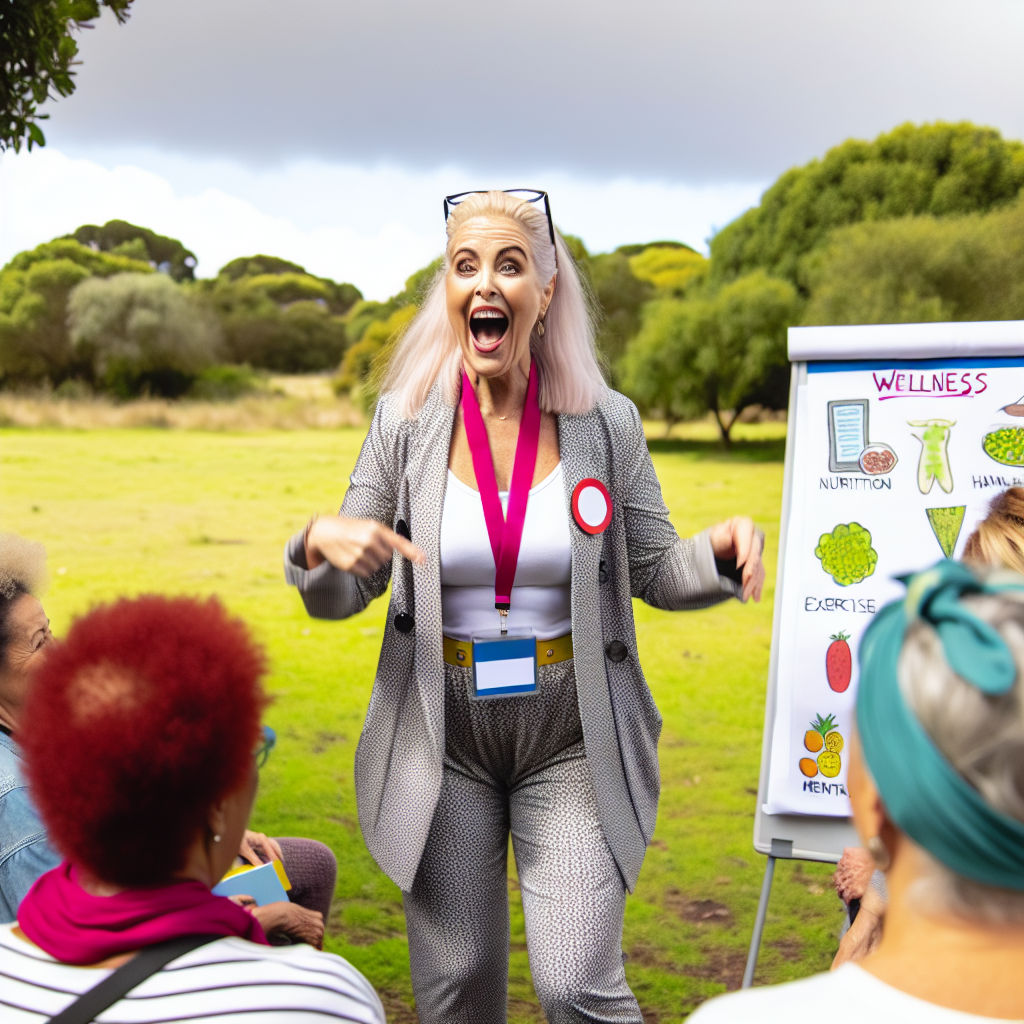Introduction:
Health educators are professionals who promote health and wellness by educating individuals and communities on healthy behaviors and disease prevention.
They play a crucial role in promoting community wellness through various programs, workshops, and campaigns aimed at improving overall health.
Community wellness is essential as it fosters healthy lifestyles, reduces healthcare costs, and enhances the quality of life for individuals in a community.
Utilizing Effective Communication Strategies:
Clear communication is crucial in promoting health education.
Various communication channels like workshops, seminars, and social media are effective.
Tailoring the message to the target audience increases engagement and understanding.
Encouraging two-way communication allows for feedback and personalized assistance.
Collaborating with Local Health Services:
Partnering with healthcare providers and community organizations offers numerous advantages in promoting community wellness.
These collaborations create a network of support and resources that can address various health issues impacting the community.
- Enhanced Access to Healthcare Services: By working with local health services, health educators can help community members access essential medical care and wellness programs.
- Targeted Health Education: Healthcare providers can offer valuable insights on community health needs, allowing educators to tailor their wellness programs to address specific concerns.
- Resource Sharing: Collaborations enable the sharing of resources such as educational materials, funding, and expertise, maximizing the impact of community wellness initiatives.
- Increased Awareness: Partnering with healthcare providers can help raise awareness about important health issues and promote preventive care among community members.
Examples of Successful Collaborations:
Several successful collaborations between health educators, healthcare providers, and community organizations have resulted in tangible improvements in community wellness.
Here are some inspiring examples:
- Community Health Fairs: Partnerships between health educators and local clinics have led to the organization of health fairs, providing free screenings, educational workshops, and resources to community members.
- Mobile Health Clinics: Collaborations with mobile health clinics have brought essential healthcare services directly to underserved communities, improving access to medical care and wellness programs.
- School-Based Wellness Programs: Health educators have teamed up with schools and educational institutions to implement wellness programs that promote healthy eating, physical activity, and mental well-being among students.
- Community Gardens: Partnering with local gardening groups, health educators have established community gardens that not only provide fresh produce but also promote outdoor activity and social connection.
These successful collaborations highlight the power of partnerships in driving positive change and fostering a culture of wellness within communities.
By working together, health educators, healthcare providers, and community organizations can create sustainable solutions that improve the overall health and well-being of individuals and families.
Through ongoing collaboration and mutual support, community wellness initiatives can thrive and make a lasting impact on the health of the population.
Find Out More: How to Engage Students in Life Skills Lessons
Conducting Needs Assessments:
Assessing community health needs involves collecting data on demographics, health behaviors, and existing health services.
Health educators analyze this information to identify gaps and determine which health issues are most prevalent.
They prioritize these issues based on factors like severity, impact on the community, and available resources.
Using Data to Develop Programs:
After identifying priority health issues, health educators collaborate with community members to develop targeted wellness programs.
These programs are tailored to address specific needs identified through the needs assessment process.
Transform Your Career Today
Unlock a personalized career strategy that drives real results. Get tailored advice and a roadmap designed just for you.
Start NowHealth educators design interventions that are culturally appropriate and accessible to the target population.
They also consider evidence-based practices and best practices in health promotion to ensure program effectiveness.
Implementing Wellness Programs:
Once the wellness programs are developed, health educators work with community partners to implement them effectively.
They may organize workshops, health fairs, or other events to engage community members and promote healthy behaviors.
Health educators collaborate with local organizations and stakeholders to increase program reach and impact.
They monitor program outcomes and make adjustments as needed to ensure program success and sustainability.
Evaluating Program Impact:
Health educators use a variety of methods to evaluate the impact of their wellness programs on community health.
They collect data on program reach, participant satisfaction, behavior change, and health outcomes.
By analyzing this data, health educators can assess program effectiveness and make evidence-based recommendations for future programs.
They share their findings with community members, stakeholders, and funders to demonstrate the program’s impact and value.
Learn More: Daily Tasks of a Disability Services Coordinator
Implementing Educational Programs
Health educators have a variety of wellness programs they can implement in communities.
One type of program is focused on promoting nutrition education to improve dietary habits.
These programs may include cooking classes, meal planning workshops, and grocery store tours.
By educating individuals on the importance of a balanced diet, health educators can help prevent chronic illnesses.
Another type of program is centered around promoting physical activity and exercise.
This may involve organizing group fitness classes, walking clubs, or sports leagues.
By encouraging regular physical activity, health educators can help community members lead healthier lifestyles.
Mental health programs aim to raise awareness and reduce stigma around mental health issues.
These programs may include workshops on stress management, mindfulness practices, and mental health first aid.
Transform Your Career Today
Unlock a personalized career strategy that drives real results. Get tailored advice and a roadmap designed just for you.
Start NowBy addressing mental health concerns, health educators can improve overall well-being in the community.
Chronic disease management programs focus on educating individuals on managing existing health conditions.
These programs may provide resources on medication management, symptom monitoring, and lifestyle modifications.
By helping individuals better manage chronic diseases, health educators can improve quality of life.
Overall, wellness programs implemented by health educators play a crucial role in promoting community well-being.
Find Out More: Essential Skills for a Successful Community Health Worker
Advocating for Policy Change:
Health educators play a crucial role in influencing public policies that impact community health.
They work to advocate for changes in policies that can positively impact the well-being of communities.
Advocacy involves raising awareness about health issues and proposing solutions to address them.
Health educators collaborate with policymakers to develop evidence-based policies that support community wellness.
They analyze existing policies and identify areas where improvements can be made to promote better health outcomes.
Role of Advocacy in Promoting Wellness:
- Advocacy is essential in promoting wellness at the local, state, and national levels.
- At the local level, health educators work with community leaders to address health disparities and access to resources.
- State-level advocacy focuses on implementing policies that support healthy environments and access to healthcare services.
- Health educators collaborate with organizations to advocate for funding and resources to support wellness initiatives.
- Nationally, health educators advocate for policies that address public health issues and improve health outcomes for all.
Health educators play a vital role in advocating for policy changes that impact community health.
They collaborate with policymakers at various levels to develop evidence-based policies that support wellness initiatives.
Advocacy is essential in promoting wellness at the local, state, and national levels by addressing health disparities, ensuring access to resources, and improving overall health outcomes for communities.
By working together with policymakers and organizations, health educators can influence public policies that positively impact community well-being.
Find Out More: Collaboration Between Family Support Workers and Other Professionals

One of the key ways health educators promote community wellness is by providing resources and support to community members.
This is essential in ensuring that individuals have access to the necessary tools and services to maintain their health and well-being.
Importance of Offering Accessible Resources and Support Services
Access to resources and support services is crucial for promoting community wellness.
When individuals have access to information and guidance, they are better equipped to make informed decisions about their health.
Transform Your Career Today
Unlock a personalized career strategy that drives real results. Get tailored advice and a roadmap designed just for you.
Start NowThis can lead to improved health outcomes and overall well-being within the community.
Showcasing Initiatives
Health educators often create initiatives such as support groups, counseling services, and online resources to provide community members with the necessary support they need.
These initiatives are designed to address specific health concerns, offer guidance, and promote overall wellness.
- Support Groups
- Counseling Services
- Online Resources
Support groups bring together individuals facing similar health challenges, providing a safe space for sharing experiences, offering emotional support, and learning from one another.
These groups can help individuals feel less isolated and more connected to others who understand their struggles.
Counseling services offer individuals the opportunity to speak with trained professionals about their health concerns, mental health issues, or lifestyle changes.
These services can provide guidance, support, and strategies for managing stress, anxiety, and other mental health challenges.
Online resources, such as websites, mobile applications, and social media platforms, offer a convenient way for individuals to access information about health and wellness.
These resources can provide valuable tips, tools, and resources to help individuals make healthier choices and improve their well-being.
Providing accessible resources and support services is a critical component of promoting community wellness.
By offering initiatives such as support groups, counseling services, and online resources, health educators can empower individuals to take control of their health and lead healthier lives.
Evaluating Program Effectiveness:
Monitoring and evaluating wellness programs is crucial for ensuring effectiveness.
Health educators analyze data and feedback to assess the impact of their programs.
Continuous evaluation allows for adjustments to be made based on the results obtained.
By measuring outcomes, educators can see what is working well and what needs improvement.
Feedback from participants helps educators understand the effectiveness of their strategies.
- Monitoring and evaluating wellness programs is crucial for ensuring effectiveness.
- Health educators analyze data and feedback to assess the impact of their programs.
- Continuous evaluation allows for adjustments to be made based on the results obtained.
- By measuring outcomes, educators can see what is working well and what needs improvement.
- Feedback from participants helps educators understand the effectiveness of their strategies.
Health Educators and Community Wellness
Health educators are essential in promoting community wellness by educating, advocating, and implementing programs that focus on prevention and overall health.
Community wellness is a holistic approach that involves addressing physical, mental, and social well-being within a community.
Health educators play a crucial role in empowering individuals and communities to make informed decisions about their health.
By educating the public on healthy lifestyle choices and disease prevention, health educators help reduce healthcare costs and improve the quality of life.
Transform Your Career Today
Unlock a personalized career strategy that drives real results. Get tailored advice and a roadmap designed just for you.
Start NowThey work collaboratively with community leaders, healthcare providers, and other stakeholders to create a supportive environment for wellness initiatives.
Through workshops, seminars, and outreach programs, health educators raise awareness about various health issues and encourage positive behavior changes.
By promoting preventive measures such as vaccinations, screenings, and regular exercise, they contribute to the overall well-being of the community.
Health educators also play a key role in addressing health disparities and advocating for policies that promote equity and access to healthcare services.
Health educators are vital agents of change who play a significant role in improving public health and promoting community wellness through education and advocacy.
Additional Resources
Community Health and Human Services Program at UAB – School of …
Addressing Social Determinants of Health: Examples of Successful …




